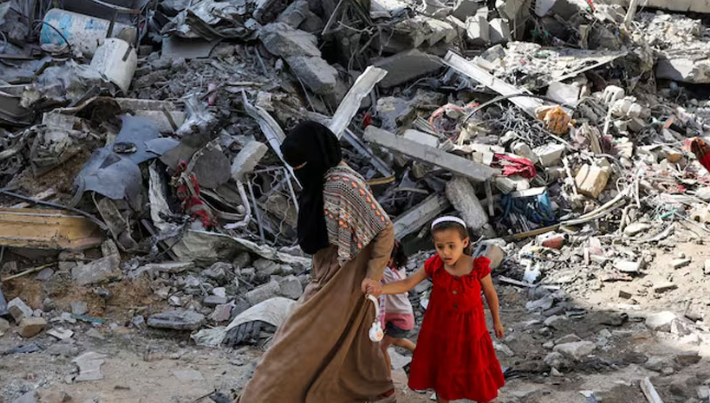New York (Web Desk/Agencies): As Gaza teeters on the brink of collapse, a senior United Nations (UN) official has renewed urgent calls for an immediate ceasefire and action to address the humanitarian crisis.
Briefing the UN Security Council, Muhannad Hadi, Deputy Special Coordinator for the Middle East Peace Process, outlined the impact of the conflict, which is now in its second year.
“As winter approaches, the horror in Gaza continues to grind on with no end in sight,” he said.
Since Oct 7, 2023, the conflict has claimed the lives of over 44,000 Palestinians, mostly women and children.
Tens of thousands more have been injured, and more than 100 Israelis hostages remain in Gaza under dire conditions.
Hadi highlighted the devastating impact of Israel Defence Forces (IDF) operations in northern Gaza, which have led to mass displacement and scores of fatalities, including women and children.
Humanitarian assistance to those in need has also been severely impacted, with UN convoys of lifesaving aid looted by armed Palestinian groups.
A UN convoy of 109 trucks carrying food was looted on November 16, with 97 trucks lost. Days later, over 20 individuals were reportedly killed during operations targeting looters, led by Gaza authorities.
“Attacks on humanitarians and humanitarian convoys must cease immediately. Law and order must be restored, and the civilian population must have safe access to vital aid,” Hadi said.
Hadi further informed the Security Council about increasing violence in the occupied West Bank, including East Jerusalem.
Thirty-two Palestinians were killed during Israeli security operations over the past few weeks, and Israeli settler attacks on Palestinian communities, particularly during the olive harvest, have escalated.
Shooting and ramming attacks by Palestinians also continued, though no fatalities were reported in the occupied West Bank or Israel, he said.
He added that Israel’s advancement of settlements and demolition of Palestinian-owned structures also continued, with some ministers “now openly calling” for the annexation of the occupied West Bank.
“I reiterate that annexation constitutes a violation of international law and must be firmly rejected,” he noted.
“Regrettably, the situation remains grave across the region. Israeli military operations continued across the Blue Line with Lebanon, as did the firing of rockets by Hezbullah toward Israel, including a barrage this weekend,” he said.
He welcomed the ongoing diplomatic efforts to reach a cessation of hostilities and urged the parties to accept a ceasefire “anchored in the full implementation of Security Council resolution 1701.”
Hadi also warned that developments across the occupied Palestinian territory suggested “an imminent risk of losing the frameworks” we have been operating under since 1967 and 1973 when the Security Council adopted the resolutions “aimed at laying the foundations for a just and lasting peace”.
“We continue to call for an immediate ceasefire, the immediate and unconditional release of all hostages and the de-escalation of tensions around the region,” he added, appealing for political and security frameworks that would help resolve the Israeli-Palestinian conflict, ending the occupation and achieving a two-State solution.
To avert further escalation, he urged the international community to renew its commitment to diplomacy and support measures that ensure long-term safety and security for both Israelis and Palestinians.
“We need a ceasefire; we need to get the hostages out; we need life-saving support delivered safely now,” Hadi added.
Also speaking, UN Special Coordinator for the Middle East Peace Process Tor Wennesland reflected on the challenges facing the region and the international community’s efforts to address the ongoing crisis.
He echoed the urgent need for a ceasefire in Gaza and the delivery of critical humanitarian aid as he acknowledged the difficulties.
“We have demonstrations in the field and in the Council how difficult this situation is at the moment…I am deeply frustrated from my visits to Gaza to see that despite all efforts…it has not been possible to deliver aid and assistance in the amount needed for the civilians living in Gaza.”
Marking his final appearance at a formal Security Council meeting, Wennesland thanked Council members, the UN Secretariat and all colleagues for their collaboration and support.
In conclusion, he emphasized the need for sustained international engagement in the search for a just and lasting resolution to the crisis.


